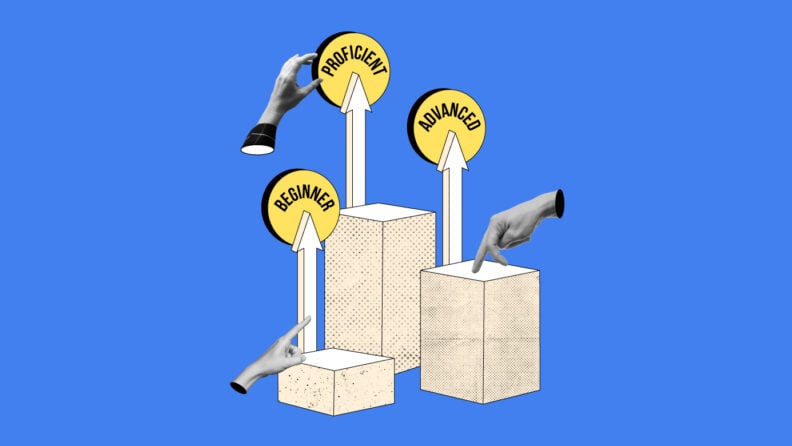There is a future where, at your job, you’ll be given a test every day.
The test will be short (there is work to do after all) and it will be variable. Yours will not be the same as your teammate’s. The questions will be adaptive (they will get harder as you get them right).
The age of AI that is upon us will open up new frontiers in skills assessments and understanding organizational skills gaps. Emerging people analytics models will start to infer what jobs you’d be a great fit for and talent teams will see who’s truly ready for a promotion or internal mobility.
Here, I’ll outline why I think our current skills assessment methods are inadequate and why we’ll see innovations like I described above in the future, knowing just how important skills are to the modern organization.
What are Employee Skills Assessments?
Employee skills assessments are tools and methods used to evaluate the competencies, knowledge, and abilities of employees. These assessments can range from formal tests and evaluations to more subjective methods like peer reviews and self-assessments.
By systematically measuring an employee's skills, organizations can make informed decisions about training, promotions, and succession planning.
Benefits of Skill and Competency Assessment
Organizations are racing to re-establish people practices like a company’s hiring process or training methods around a skills-first approach.
As it’s been put, skills are the “currency of the future”. We know that they matter and will continue to matter.
Skills, in short, are a building block for our human capabilities and thus our place in the professional world.
And the numbers prove this. The soft skills training market alone is estimated to be more than $47 billion and, since skills are estimated to change dynamically in the coming years, this will only grow.
Skills assessments provide numerous advantages in assessing training effectiveness and helping key personnel feel valued through investment in developing their skills.
Below are some of the key benefits for employees:
Learning and development program refinement
Around 77% of learning and development professionals believe personalized learning is critical in maintaining employee engagement. With good reason, as it's been reported in LinkedIn Learning's latest report that 53% of Gen Z employees sees learning as their ticket to career progress.
Assessing the skills of your employees allows you to tailor learning and development programs to their specific needs and help them develop the right skills which will support business goals.
Evaluate skills of your employees
Regular assessments help in keeping a pulse on the competencies of your workforce.
For instance, after implementing new software, a skills assessment can identify which employees are adapting well and who might need additional support, ensuring everyone is on the same page.
Close skill gaps
Identifying and closing skill gaps is crucial for maintaining productivity and innovation.
By pinpointing areas where employees need improvement, organizations can provide targeted training to address one of the biggest needs across the workforce. A study by the World Economic Forum found that 54% of employees will need significant reskilling by 2025 to meet changing job demands.
Improve performance reviews
Performance reviews become more meaningful when they’re backed by concrete data from skills assessments. This benefits not just employees, but their managers, a group historically frustrated by the effectiveness of skill assessments in helping them guide their direct reports in the right direction.
This approach ensures that feedback is based on measurable skills rather than just subjective opinions, leading to more objective and constructive performance discussions.
Better succession planning
Succession planning becomes more effective when you have a clear understanding of the skills within your organization. Improving your assessments will help you identify potential leaders by evaluating not just their current performance, but also their readiness for future roles.
The Current State of Employee Skill Assessment Strategy
I do think we’re a few years out from the vision I laid out above, so it’s worth looking at where we are today.
Many organizations have done a great job of building out competency models, running skill gap analysis, and laying a foundation for building future skills in their learning management systems.
The best ones achieve this by working backward. They start with the idea of what skills they want to create or upskill in the first place (among their population).
It’s crucial to start a skills assessment strategy by working backward. Just don’t dwell at this stage too long. I’ve seen companies take years honing and tweaking competency maps and models only to fall short on actually testing or assessing the assessment tools.
As Maxwell Wessel, Chief Learning Officer at SAP, says:
"In reality, most of our organizations are facing big changes that require us to be thoughtful around the 5-10 skills we really need to build at scale. Getting that thinking done, and then getting into the real workforce change, is so much more important than getting the skill definition perfect."
As it stands today, organizations use a variety of skill assessment approaches. I’ll list those out here and discuss my critique of each, showing why we’ll need to be more innovative to uncover the truth of our real talent.
Methods of Skills Assessment
Okay, let's take a closer look at how skills are typically assessed and ponder how we can do it better.
Hard skills exams
Perhaps the easiest of all assessment types, these are used when testing for skills where questions have specific and clear solutions.
Hard skills exams give you a clear sense of how much someone knows about statistics or laws, but you need to assess early and often to really uncover this and, if these aren’t adaptive, you’re asking folks who may be experts already to waste time assessing themselves.
This starts with pre-employment testing and continues throughout the employee lifecycle as employees look to advance their careers and change roles. One of the benefits of modern recruiting software is there are several tools that can help with this, but once employees are hired, your performance management tools have to step in.
Workera is a good example of a company aiming to disrupt this with better testing and by giving employees a customized learning plan based on their scores. In the screenshot below, courtesy of Workera's Resource Center, you can see the way this gets laid out for a learner.
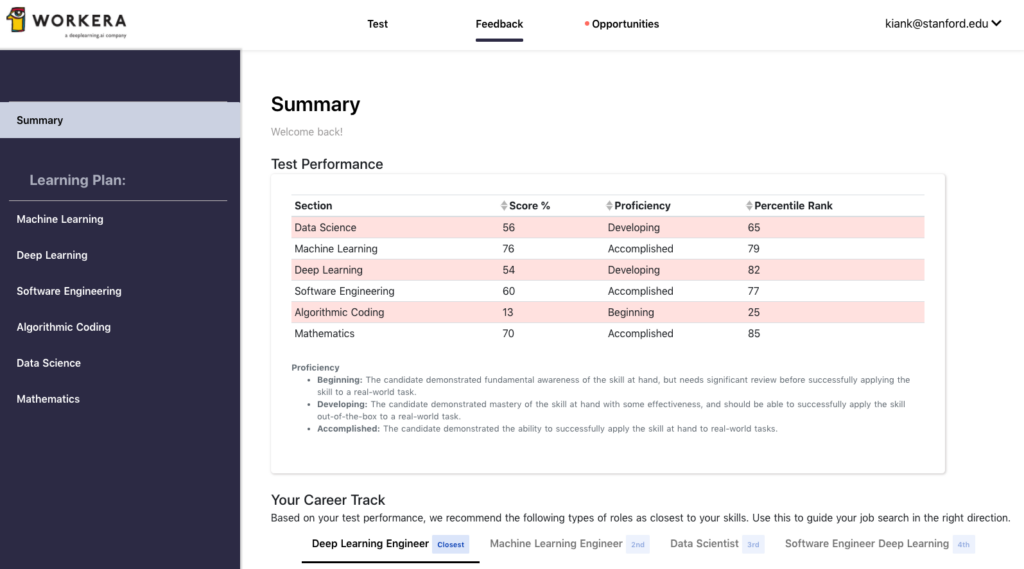
The proficiency level is mapped out by the abilities a learner possesses around this skill. For example, in this screenshot you see the development of someone looking to show mastery of machine learning models. Below you'll find how the levels of mastery would be mapped out.

This sort of examination of a person's abilities allows for an adaptive testing approach that reveals not only what a person learned, but the depth with which they're learning it.
Soft skills exams
Some talent teams have tried moving toward soft skill exams to measure talent on their own, but it will be more popular to use features within your recruiting software to do this in the coming years. The challenge now is defining these skills and the content you want to test on.
What is the “right” way to measure communication or collaboration? Right now, we don’t have that definition and I don’t think we’ll ever have an objective one. Instead, organizations will design their own approach to these—based on their product, values, strategy, etc—and can then test on it.
For now, perhaps the best way forward is through tools like HiPeople, which offers soft skill assessments that show the person's self assessment of their personality and soft skills, the perception of their former colleagues and the recruiting team across a variety of categories, such as stress tolerance, creativity, grit, etc. It then assigns a score for each based on that feedback. (Screenshot below)
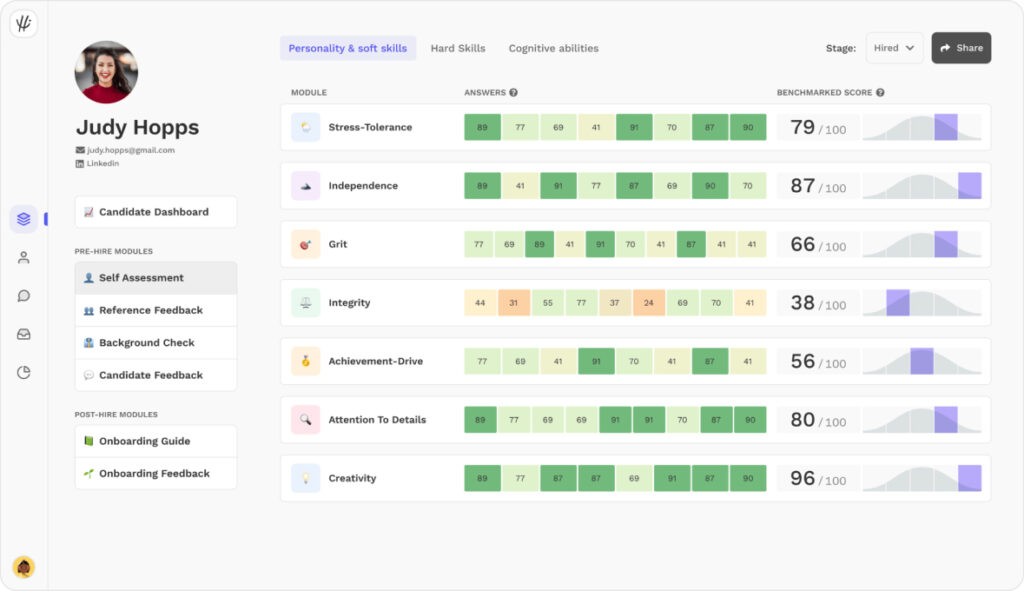
Case studies & hands-on experience
These are a good workaround to feeling like you’re burdening folks with a culture of assessment.
After all, learning should be fun and interactive (often forgotten about for adults). So companies are innovating with simulations and case studies and seeing how folks react, respond, and show their strengths.
However, these are not always the actual skills employees need on-the-job and the grading or assessment parts of these can often be specific to the task at hand instead of broad to fit a whole skill set.
Additional Methods of Assessment
To ensure an effective skills assessment process, it's essential to utilize a variety of methods. Here are some that can provide valuable insights:
Performance evaluations
Probably the most used form of employee assessment and yet they, and the very idea of subjectively judging a skill set, provide a loose base to evaluate folks on.
By reviewing an employee’s past performance, you're trying to gauge how well they apply their skills in their role, but as anyone in talent development knows, the process is often marred by bias and ineffective data practices.
The performance management tools you use in assessing employee skills will help you develop your approach, as will any sort of visualization tool that you provide to managers or other leaders to map out the personnel on your team, such as a 9 box talent review.
Peer reviews
Peer reviews offer a unique perspective on an employee’s skills by gathering feedback from colleagues who work closely with them.
This method helps in understanding a person's impact on team dynamics and identifying skills that might not be apparent in formal assessments.
Tools like Deel's Engage platform offer a good way to do this and identify a person's strengths and areas for improvement without it becoming a personal matter with their co-workers.
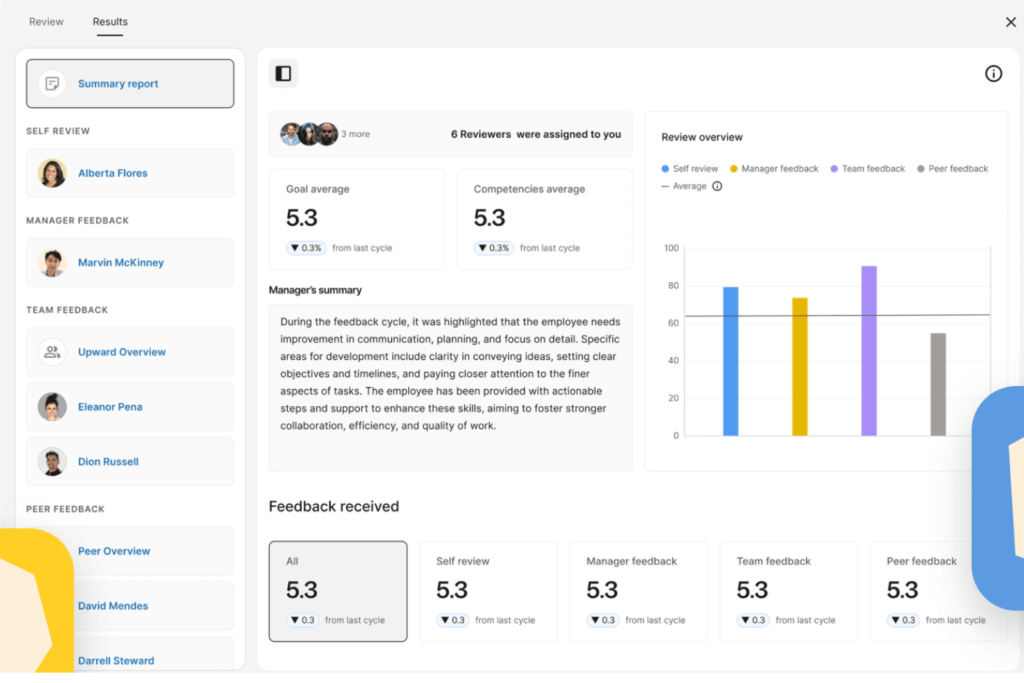
Behavioral interviews
Behavioral interviews are designed to assess how employees have handled specific situations in the past, providing insights into their competencies.
For example, asking an employee to describe a time they managed a conflict is an attempt to see how they talk about their problem-solving and communication skills.
Simulation exercises
Simulation exercises allow employees to demonstrate their skills in a controlled environment that mimics real-world challenges. This method is particularly useful for assessing complex problem-solving abilities and decision-making under pressure.
Best Practices for Skill Assessments
To maximize the effectiveness of your employee skills assessments, consider the following best practices to guide you along the way.
Align with job requirements
A customer service role might require assessments focused on communication and problem-solving skills. If you're going to hire a manager, it will be a completely different set of criteria that drives your decision.
Make sure your assessment is applicable to measuring the type of skills needed in the role and how well suited this person is to the role.
Competency models
Building a competency matrix helps in understanding the strengths and weaknesses of your workforce.
This model can guide the development of assessment tools tailored to the specific needs of the organization and help you identify the skills you're next hire needs to possess or that your current employees need to develop.
See an example of competency matrix from online course provider GetSmarter below.
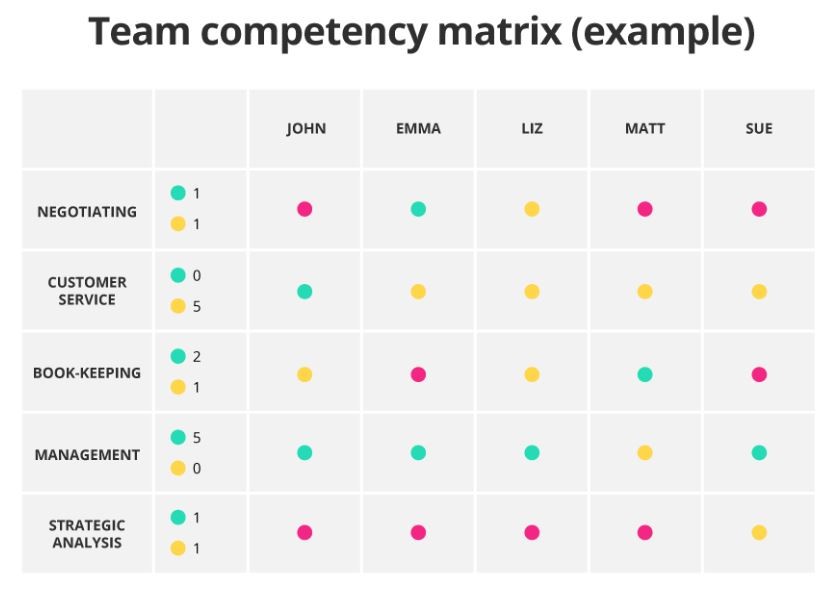
You can read more about competency models in our article on competency based performance management.
Multiple assessment methods
Using a blend of assessment methods provides a more accurate evaluation of an employee’s skills.
This approach mitigates the limitations of any single method and offers a more holistic view as well as more opportunities for an employee to showcase their abilities.
Development plans
The creation of personalized development plans hinges on the insight gleaned from your employee skills assessment. But it isn't the end all be all of how you look to develop an employee.
When all is said and done, you need employee buy in to ensure your skills assessment enhances their career progression. Your development plan should look to accommodate their personal goals and help them find a path toward roles they're well suited for and that the company can support through continuous learning.
Regular assessments
Skills assessments should not be a one-time event or even a once per year event. Regular assessments help track progress over time and ensure that the workforce evolves with the demands of the business.
Besides, what's the point of all this high tech performance appraisal software if you're not going to help your people monitor how they're progressing in a consistent fashion.
Sharing results
Transparency is key. It's been shown that somewhere around 87% of job seekers look for a culture of transparency in their next workplace.
Sharing assessment results with employees not only builds trust but also engages them in their own development. It encourages employees to take ownership of their growth and aligns their goals with the organization’s objectives.
Performance Reviews And Subjective Skill Sets
This all sounds great, but despite all the tech and techniques we're talking about here, most companies are still going to revolve a lot of skill measurement initiatives around performance appraisals.
Since this is established practice at companies, many use this opportunity to ask managers, peers, and employees themselves to weigh in on their own skills and career development.
This then ties into things like promotion, bonuses, and compensation, and becomes a kind of jockeying for whoever can tell the best story about their growth.
There are obvious flaws here. One is that, typically, this only happens once or twice a year at best. The second is the obvious subjectivity of trying to gauge team skill sets, including the subjectivity born out of recency bias (although more continuous performance management can help mitigate some of these issues).
Often, performance reviews come with self-assessment as well and, for much of the last decade, we’ve measured skills and skills growth by asking people how confident they feel in their ability to do something.
There’s danger in this of course, not just because of the Dunning-Kruger effect where we assess ourselves above average, but because we start to treat skills as confidences instead of actual abilities.
Companies have built their ROI stories around employee development on this idea of confidence. You can see iterations of Degreed doing this below—the ratings in this case are given by the person (or a manager) and are self-reported.

In the “audacious” future I described at the start of this article, there will be no need for self-assessment of skills, only effort and sentiment.
The idea of trying to gauge how good we are at something will be met with a swift change—the way I should not insist I could be a professional bowler or major leaguer. I don’t have what it takes, regardless of how I feel.
There’s good news though. Adaptive assessments will not only positively impact the employee journey, they’ll also be easier and easier to make—having profound repercussions in building employee strengths, productivity, and recruiting.
Adaptive Assessments as the New Way
We haven’t yet translated what it could do to an organization’s culture if workers are actually getting better at the necessary skills for their roles and careers. If they could see their own progress and recognize their employer as a true facilitator of their growth and development.
From onboarding to offboarding, a person should be able to approximate their growth in a certain skill or two.
We should be able to look back at jobs and see them for the skill accelerations or jumps they provided, not just the titles or roles we had.
I think we’ll look back and wonder how it was that hiring managers selected the best candidates in recruiting without knowing their real skill benchmarks. How did we allow the creation of resumes where someone swore they had certain skills without ever having proven it?
Companies should want to know this data too. Learning and development teams need to start being more data-forward and should, in the next few years, be expected to hand data to their leadership on skill growth by department and aggregated over groups or the company as a whole.
Those that are doing this today (and I demonstrate how you can do so here), are better equipped to meet the demands of a changing workforce and get more budget for L&D programs by showing the business and productivity impacts.
Assessments are the catalyst to a new age of learning (which will be AI-powered in its ability to enable personalized learning plans and tutors) and our approach to uncovering the true skill level of all.
And the good news is this: it’s never been easier to produce assessments. AI will make it easier than ever to create the needed kind of content: questions, tests, quizzes, hands-on practice, etc.
New employee evaluation technology, and even pre-employment testing software, will shape much of what the testing experience is like going forward.
We’ll have thousands of questions on any skill to test on, and they won’t just be the same multiple choice or true/false that you’re used to. Imagine doing a case study that adapts to your answers in real-time—that’s what AI can do.
Employee training will see the revolution from better assessments and better analysis and it will be part of the productivity rise that AI can promise.
Wrapping Up On Skills
Skills is the buzz about the proverbial town right now. Organizations are building skills based frameworks to understand what skills are needed to succeed in each role and companies are selling trainings wrapped around specific skill-building.
This feels like all the right infrastructure for now, especially when you consider what will need to be changed in the workplace by 2030.
What comes next will usher in a revolution in skills measurement and personalized learning that comes from that.
You’ll have something akin to a baseball card with your metrics and ratings on whatever skills you’re pursuing. Companies can and will hire new talent from this. Organizations will sell you on what you need to get better. It may sound a bit funky but it could usher in the most effective upskilling era in human history.

